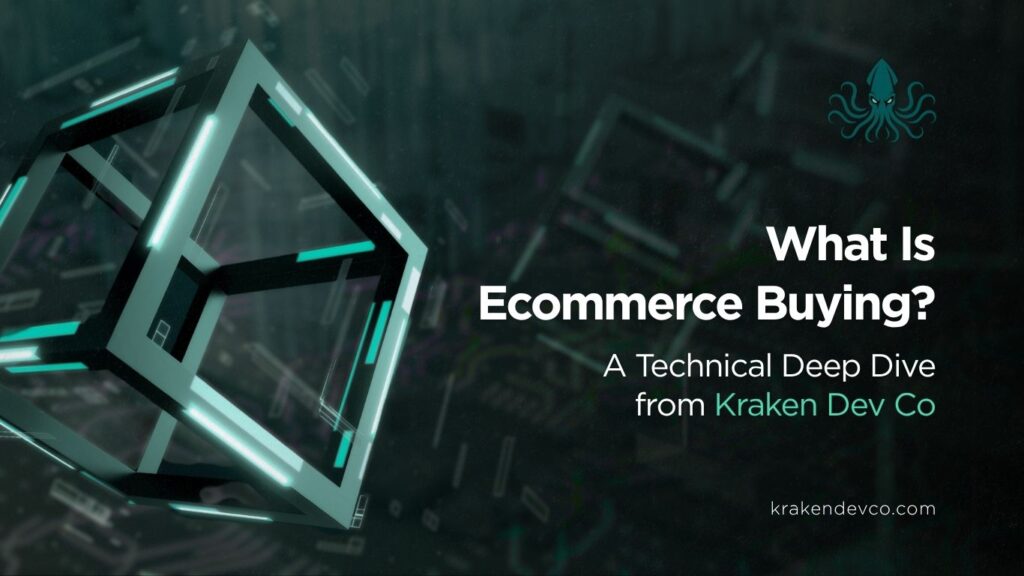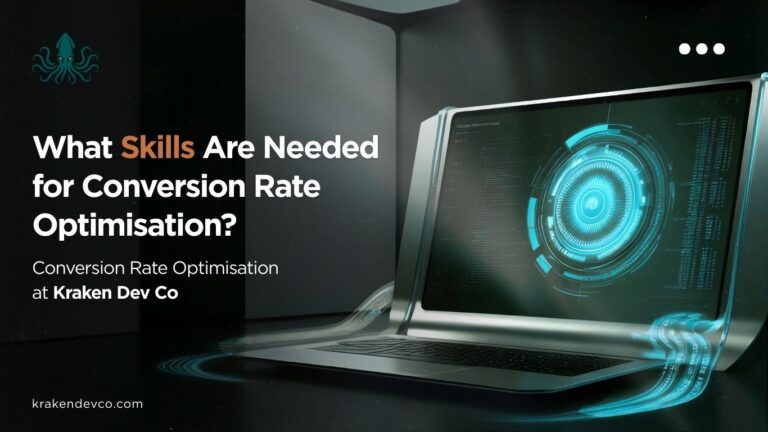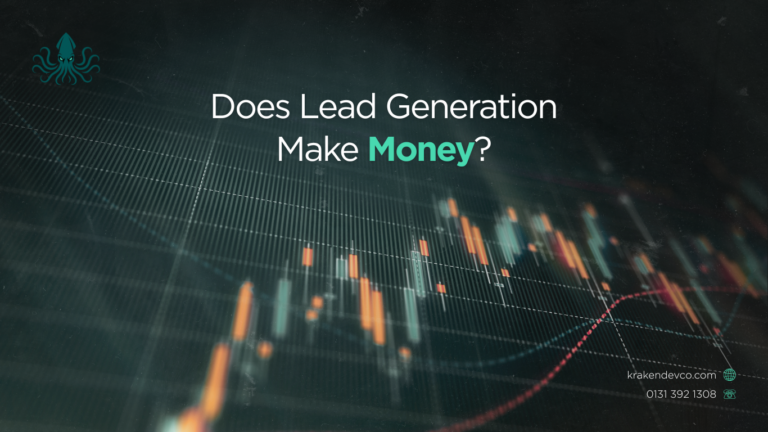
Architecting the Digital Commerce Engine
Ecommerce buying isn’t about browsing products. It’s about precision-built infrastructure designed to convert, scale, and optimise profit. At Kraken Dev Co, we don’t just build online stores. We engineer ecommerce systems that sell.
This guide breaks down what ecommerce buying really means—from system logic to customer experience, from platform architecture to backend workflows. The goal: clarity, not buzzwords.
What Is Ecommerce Buying?
Ecommerce buying is the entire digital journey that takes a user from interest to transaction. It’s not a button. It’s a layered system of logic, signals, content, and integrations engineered to create trust and remove friction.
From the customer’s side, it’s online shopping. From the business side, it’s optimised online selling—an orchestration of ecommerce platforms, payment systems, digital marketing, and logistics infrastructure.
Whether you’re operating a niche Shopify web store or managing an enterprise-scale ecommerce platform, the underlying systems must be aligned to support online sales 24/7.
Core Components of the Ecommerce Buying Stack
1. Platform Choice
Choose the right ecommerce platform. Shopify, Adobe Commerce, WooCommerce, BigCommerce, or custom stacks with headless CMS + APIs. Your tech stack defines your flexibility, speed, and cost.
Headless architectures decouple the frontend from the backend, enabling faster load times, custom UI layers, and integration with third-party ecosystems like a fulfilment network or mobile commerce engine.
2. Product Listings & Content
Precision matters. Your product catalogue must include:
- Unique product descriptions with structured data
- Accurate SKUs and variant mapping
- Keyword-optimised metadata for search engines
- AI-assisted classification via Shopify Magic or external AI tools
A well-structured product catalogue feeds content management systems, enhances your online presence, and supports automation for abandoned cart recovery and email marketing.
3. Checkout Systems & Payment Options
Payment gateway and provider decisions impact:
- Supported payment methods (Digital Wallet, online banking, cards, electronic money)
- Security protocols (SSL certificate, tokenisation, PCI compliance)
- Transaction fees and international tax rates
- UX (one-click checkout, multi-lingual flow, support for electronic tickets or group buying)
Kraken Dev Co builds with resilience: multi-provider payment systems, automatic tax rate logic per location, and fallback routing if one payment system fails.
4. Fulfilment & Logistics Management
Every ecommerce business must account for:
- Label generation workflows
- Real-time carrier integration with tools like DPD or FedEx APIs
- Dynamic shipping rate calculation
- Supply chain sync between inventory management systems and ecommerce platforms
- Returns logic and SLA compliance
Digital commerce isn’t complete until delivery is. Ecommerce logistics integration ensures performance, trust, and margin protection.
5. Customer Service & Support Workflows
Post-sale support is a core engine of ecommerce lifetime value.
- Conversational commerce via chat, live agents, and instant messaging
- AI-driven automated emails: order confirmations, reviews, upsells
- Integrated CRM workflows with customer support pipelines
- Email escalation rules tied to refund or dispute triggers
Support teams armed with data can defuse dissatisfaction before it escalates. Customer service is retention infrastructure.
Where Ecommerce Buying Happens
- Online store: Custom or platform-based sites. Full brand control and analytics depth.
- Marketplaces: Amazon, eBay, Alibaba Group. Scale fast but margin risk.
- Social commerce: TikTok Shop, Instagram Shopping, Facebook Marketplace.
- Mobile commerce: Mobile-first design for retail market and on-the-go buying.
- Online auction & group buying: Incentivised demand models.
- In-app sales & app marketplace: App Market integrations, especially for mobile-first ecommerce businesses.
- POS systems: Hybrid setups combining physical and digital checkout.
Kraken Dev Co supports multi-channel integration to unify inventory, analytics, and user experience.
Ecommerce Business Models
- B2C: Direct to consumer models using optimised online shopping flows.
- B2B: Account-based pricing, volume discounting, enterprise content management.
- D2C: Vertical integration with full control of customer data and marketing efforts.
- C2C: Platforms enabling peer-to-peer online selling.
- C2B: Reverse ecommerce, freelancers or micro-sellers.
- Taobao Village: Distributed rural ecommerce clusters—high-volume, low-cost decentralised online selling.
Kraken Dev Co designs ecommerce architecture capable of sustaining multiple models concurrently.
Revenue Structures
Revenue logic shapes every architectural and marketing decision:
- Direct online sales
- Subscription billing via Stripe, Chargebee, or custom integrations
- Affiliate and referral models
- App store models (iTunes Store)
- Electronic tickets, B2B passes, digital goods
- Transaction-fee models used by marketplaces
Kraken Dev Co maps each revenue model to backend integrations including customer data flow, fulfilment logic, and financial compliance.
Marketing Infrastructure That Drives Buying
Kraken Dev Co integrates:
- SEO architecture: schema, core web vitals, entity SEO
- Email marketing tools: Klaviyo, Mailchimp, automated emails, lifecycle sequences
- Social media marketing integrations: Instagram, TikTok, Meta Ads
- Abandoned cart recovery logic
- Content management for product education
- App marketplace tools for upsell and analytics
We build systems to help you track ROI across every click and touchpoint.
Compliance, Security & Trust
Ecommerce cannot function without:
- Internet security infrastructure: SSL certificate, secure checkout, firewall layers
- GDPR compliance: data handling, consent mechanisms, retention logic
- PCI-DSS compliance: encrypted card handling
- Tax rate accuracy across regions
- Third-party certifications: reviews, verified badges, carbon neutrality signals
Trust is not cosmetic. It’s engineered.
Covid-19 Pandemic & The Permanent Shift
The Covid-19 pandemic forced even traditional retail brands into ecommerce. Now, consumer expectations are:
- 1-click checkout with multiple payment options
- Transparent shipping costs and delivery estimates
- Mobile-optimised UX
- Reliable customer support
Retail e-commerce sales grew dramatically during Covid. That trend hasn’t reversed. Ecommerce is now foundational. Kraken Dev Co ensures resilience against future disruptions.
Future-Proofing: Trends in 2025 and Beyond
- AI-assisted commerce: Product recommendations, customer behaviour reports, inventory forecasting
- Mobile-first UI: Fast, thumb-optimised funnels
- Voice & conversational commerce: Integrating instant messaging with cart flows
- Sustainable practices: Carbon-neutral shipping, local fulfilment routing
- Label generation automation: Speed and accuracy in B2B and D2C operations
- Digital wallet expansion: PayPal, Google Pay, Apple Pay, region-specific wallets
- BNPL (Buy Now Pay Later): Now a critical payment option for Gen Z buyers
Kraken Dev Co’s Ecommerce Engineering Process
Here’s how we execute:
- Audit your current ecommerce infrastructure: platform, data, fulfilment, traffic
- Map opportunities: platform upgrade, checkout speed, security gaps
- Design the new stack: CMS, payment gateway, inventory system, frontend logic
- Build and integrate: clean code, secure endpoints, scalable architecture
- Launch & test: transaction testing, UAT, live checkout simulations
- Optimise continuously: SEO, CRO, email marketing, customer support workflows
Why Kraken Dev Co?
We engineer ecommerce stacks, not themes.
- Enterprise-ready ecommerce platforms
- Custom checkout engineering
- Mobile commerce optimisation
- SEO-first architecture (including entity-based SEO)
- Deep integration with inventory and POS systems
- Payment systems built for global scale
From the retail market to online auctions, our clients span B2B, B2C, D2C, and hybrid models.
Final Word: Ecommerce Buying Is an Engine
Ecommerce buying is the visible tip of an engineered system. It connects:
- Systems
- Marketing tools
- Payment processing
- Shipping
- Support
- Strategy
If your online store isn’t structured for performance, resilience, and growth—you’re not in ecommerce. You’re in digital risk.
Kraken Dev Co helps ambitious brands escape generic platforms and build ecommerce operations designed for scale.
Ready to upgrade your online selling infrastructure? Visit https://krakendevco.com to connect with a strategist.



